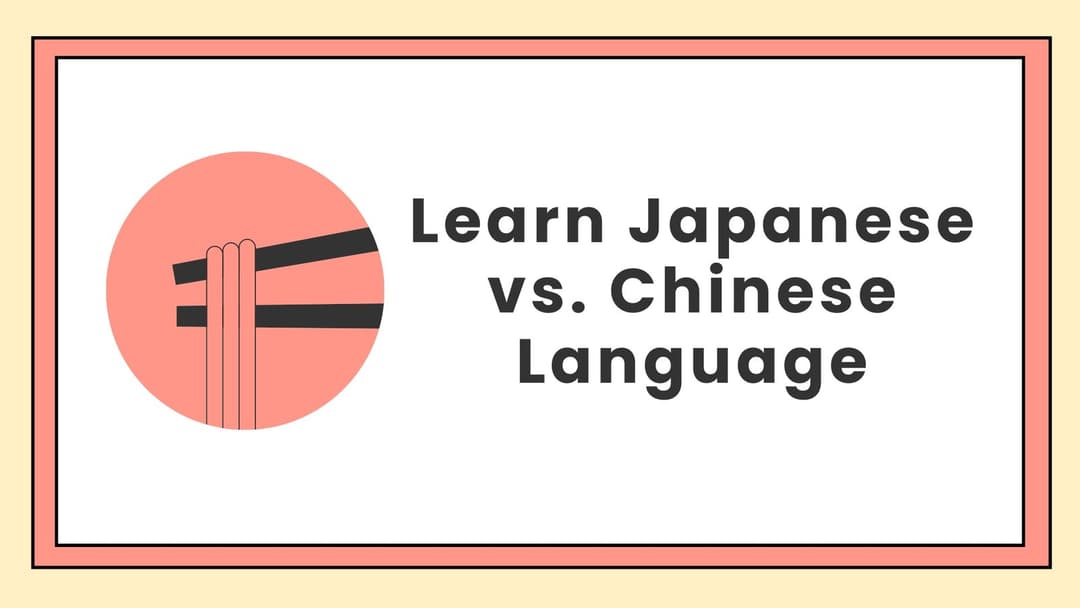
Japanese vs. Chinese: Which Language Should You Learn?
Enroll Now
Published: 2025-06-02 11:20:53
In today’s globalized world, the interest in East Asian languages has surged. From anime and K-dramas to international business and diplomatic relations, languages like Japanese and Chinese are attracting learners from all over the globe.
If you’ve found yourself at a crossroads wondering whether to learn Japanese or Chinese, you're not alone. Both languages offer rich cultural heritage, unique writing systems, and exciting career possibilities. But choosing between them isn’t just about aesthetics — it's about personal goals, practical use, and linguistic challenges.
In this guide, we break down the difference between Japanese and Chinese language structures, ease of learning, professional prospects, and more, helping you make an informed decision based on facts and personal interests.
Japanese vs. Chinese: Key Differences Explained
Grasping the structural and linguistic differences between Japanese and Chinese is essential before choosing which to learn. From writing systems and pronunciation to grammar rules, each language offers unique challenges and advantages. A clear understanding helps you align your choice with your learning style, goals, and personal interests. Read More.

Writing Systems
When comparing the Japanese and Chinese writing systems, both languages utilize Chinese characters, but in different ways.
- Chinese (Mandarin): Primarily uses Simplified Chinese characters in mainland China and Traditional Chinese characters in Taiwan and Hong Kong.
- Japanese combines kanji (borrowed Chinese characters) with two phonetic scripts—hiragana and katakana.
While Chinese relies entirely on logographic characters, Japanese learners must memorize multiple character sets, which can initially seem more complex.
Pronunciation and Tones
The Japanese vs Chinese pronunciation debate often highlights tonal complexity.
- Chinese: Mandarin is a tonal language, meaning the same syllable pronounced differently can mean entirely different things. Mandarin has four tones, which can be tricky for beginners.
- Japanese: Japanese is non-tonal, making pronunciation relatively easier. However, pitch accent can influence meaning but is far more forgiving than Chinese tones.
Grammar Structure
In terms of grammar:
- Japanese follows a subject-object-verb (SOV) structure. For example, “I sushi eat.”
- Chinese: Uses a subject-verb-object (SVO) structure similar to English. For example, “I eat sushi.”
If grammar is your concern, Japanese vs. Chinese grammar comparisons show that Chinese grammar is generally more straightforward — no verb conjugation, plurals, or tenses to worry about.
Which Language Is Easier to Learn?
One of the most frequently asked questions among language learners is, which is easier, Japanese or Chinese? The answer depends on your background. Japanese has complex grammar but simpler pronunciation, while Chinese has easier grammar but challenging tones and characters. Each language presents unique difficulties and learning curves. Click Now.
For English speakers, each language presents unique challenges:
- Chinese difficulty: Mastering tones and memorizing thousands of unique characters without phonetic clues can be daunting.
- Japanese difficulty: While pronunciation is easier, grammar and learning three scripts make it a long-term commitment.
Japanese vs Chinese difficulty depends on what you personally find harder — tones or grammar complexity.
Career and Business Opportunities
Your career goals play a major role in deciding between Japanese and Chinese. Mandarin opens doors in global trade, diplomacy, and multinational corporations, while Japanese is valuable in technology, gaming, and automotive sectors. Choosing the right language can boost your professional growth and align your skills with industry demands. Click here.
- Chinese (Mandarin): Spoken by over 1 billion people, Mandarin is the most widely spoken language in the world. It’s in high demand in sectors like international trade, diplomacy, technology, and finance.
- Japanese: Japan remains a global leader in technology, gaming, robotics, and automotive industries. Fluency in Japanese can open doors in multinational companies, translation, tourism, and language education.
So when it comes to career opportunities in Japanese and Chinese, both languages are valuable, but Mandarin may offer a broader reach.
If you're looking for the best language to learn for business, consider your industry. Mandarin is more useful for global trade; Japanese is ideal for niche industries like gaming and design.
Learning Goals and Personal Preference
Sometimes, choosing between Japanese and Chinese is driven more by passion than logic. Personal interests like anime, history, or travel often guide learners toward the language they truly enjoy.

- Love anime, manga, or Japanese cuisine? Japanese might be your perfect match.
- Fascinated by Chinese history or calligraphy, or plan to visit China frequently? Then Mandarin could be more rewarding.
Learn Japanese or Chinese based on what excites you most. Motivation plays a huge role in language retention.
Final Comparison: Mandarin vs Japanese Language Learning
Let’s quickly compare key factors like pronunciation, writing systems, grammar, and career value to help you decide whether Japanese or Chinese is the better language choice for your goals.
| Criteria | Japanese | Chinese (Mandarin) |
| Tones | None | 4 Tones |
| Writing System | Kanji, Hiragana, Katakana | Simplified/Traditional Characters |
| Grammar | Complex (verbs, particles) | Simpler (no conjugation) |
| Pronunciation | Easier | Harder (due to tones) |
| Global Reach | Japan-specific | Spoken in many countries |
| Business Value | Great for tech/gaming | Global commerce & diplomacy |
In short, the Mandarin vs. Japanese language learning path depends on your linguistic preferences, motivation, and long-term goals.
FAQs
1. Is Japanese or Chinese more useful for travel?
Mandarin covers more countries, but Japanese is essential for navigating Japan. It depends on where you plan to travel.
2. Which language takes longer to learn fluently?
Japanese generally takes longer due to its complex writing system and grammar. Mandarin is more time-efficient for basic fluency.
3. Is Japanese or Chinese harder to write?
Chinese writing is more difficult due to the lack of phonetic clues. Japanese writing is complex but benefits from phonetic scripts like hiragana and katakana.
4. Can learning both languages be beneficial?
Absolutely. Many learners study both to increase career opportunities in Asia and deepen cultural understanding.
5. What’s better for business, Japanese or Chinese?
Chinese is better for global business reach, while Japanese is ideal for industries like tech, gaming, and automotive.
Conclusion
So, Japanese vs. Chinese: Which language should you learn? The answer truly depends on your personal goals and interests—there’s no one-size-fits-all choice.
Choose Japanese if you're passionate about Japanese culture, anime, or manga, or if you plan to work or live in Japan. Its unique writing system and rich cultural depth offer a rewarding experience for dedicated learners.
Opt for Chinese (Mandarin) if you're aiming for global business opportunities or wish to communicate with one of the world’s largest populations. Its growing influence in international trade and diplomacy makes it a valuable asset.
Both languages offer long-term benefits—from cultural enrichment to professional advancement. So, follow your passion and pick the language that inspires you the most. The right choice is the one that aligns with your purpose and motivates consistent learning.
